Peter MALONE
Saturday, 18 September 2021 19:22
California Kid
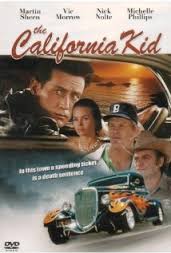
CALIFORNIA KID
US, 1974, 73 minutes, Colour.
Martin Sheen, Vic Morrow, Michelle Phillips, Stuart Margolin, Nick Nolte.
Directed by Richard T. Heffron.
An interesting offbeat telemovie with echoes of Duel. It is also reminiscent of the Australian film The Cars That Ate Paris -a small town preying on travellers with the focus on cars. The film in written by Richard Compton, who wrote Macon County Line and Return to Macon County. There is an interesting atmosphere, a range of background music, interesting performances especially by Martin Sheen and Vic Morrow with a good character sketch by Michelle Phillips.
1. The impact of the film as a telemovie thriller, the focus on cars, police, violence? The fifties setting? A piece of Americana? A blend of ingredients for entertainment and social comment?
2. Response to the telemovie, to action sequences, personal drama? The impact for the home audience?
3. Colour location photography, the atmosphere of the united states, the outback town, the roads and highways, mountains? Cars and special effects? The range of the musical score and its atmosphere?
4. The prologue with the Sheriff destroying the car and killing its occupants? Audience judgments on him? Introduction to the complexities of the plot?
5. The set-up in the town: the Sheriff and his rigorous application of the law, the number of charges and the range of people prosecuted for speeding offences, his rigorous enforcing of the law especially with the youngsters? The later explanation of his wife and child being killed and the sequence of him drinking at hem* reminiscing? The heavy fines? The judge. the assistant, the taxi driver in on the deal? The hostility of the Sheriff towards outsiders, his control of the town, his self-appointed wreaking of vengeance? The challenge by Mike? Reality? Ultimately his death? A credible picture of a man holding to principle and driven insane? An embittered man going too far? A comment on American justice and the West?
6. Mike as hero - his car as the California Kid? The driving through the town? The slight rise above the speed limit and the being charged? Indication of his knowledge of cars? In the court, paying the fines, paying the taxi driver? His observation of the application of justice? The audience not knowing the reasons for his being in the town? His decision to stay? The visit to the diner and his friendship with the girl, the short liaison, their talking together? Revelation of character? The long sequences of his testing the road and speed? His discovery of the truth? His friendship with the kids and letting them drive? Finding his brother's car in the car yard? Knowledge of the truth, assistance at the death? The funeral? His goodbye to the girl and his inability to stay in the town and her inability to leave? Setting up the Sheriff? His death after the pursuit? His waving goodbye?
7. The girl and her work in the diner, the story of her husband in prison and expecting him to come back? any liaison with Mike? The control of the Sheriff? The point of her reflections on him? Her staying in the town?
8. The man at the garage and his callow attitudes about the victims and the cars, his kid brother? The focus on cars, machinery? The Sheriff's car? Mike's car? The group socialising - the girl and her being tipped off by the Sheriff? Her egging the boy on to drive test? His death and her injury?
9. The group in the town and their control: the Sheriff and his imposing the rules? The judge, the assistant, the taxi driver?
10. The sketch of people in the town - the tourist charges at the beginning, the poor family, the people in the diner, the young people in the town?
11. The impact of the film and its plot, quick character delineation within a short time? A picture of a cross-section of Americans? Justice? Violence, the law? Ugly America?
Published in Movie Reviews
Published in
Movie Reviews
Tagged under
Saturday, 18 September 2021 19:22
Handful of Dust, A/ 1973
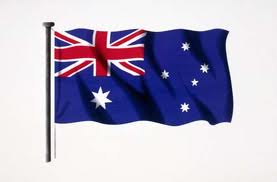
A HANDFUL OF DUST
Australia, 1973, 43 minutes, Colour.
Ayten Kyululu, Ilhan Kyululu, Vedat Cevikoz, Carol Rachelle.
Directed by Ayten Kyululu.
The Golden Cage and A Handful of Dust are two short features by Turkish writer director Ayten Kyululu. They were produced with the assistance of the Australia Council - and contribute to some understanding of Turkish migrants trying to establish themselves in Australia.
The theme of ethnic groups in Australia has not been explored very much in the Australian features of the '70s. Tom Cowan made Promised Woman, a look at a bride brought out from Greece and then rejected by her fiance and having to cope in Sydney. Caddie and Cathy's Child, both directed by Donald Crombie, focus on Greek migrants as does Paul Cox's Kostas. There are many worthwhile contemporary stories to be filmed in the light of Australia's multicultural and multinational situation.
These films are beginner's work - but as such show a great deal of sophistication and knowledge of film-making. At times they are wordy, at times they move to the merely melodramatic. At times there is too much contrivance. A Handful of Dust, though short, makes more immediate impact because of the moving performance by Vedat Cevikoz as a dignified and victimised middle-aged Turkish woman. The two men at the centre of The Golden Cage, while sympathetic, do not elicit the same kind of audience response.
Kyululu had the assistance of a number of people who were to make their mark in the resurgent Australian film industry - Esben Storm and Richard Moir helped with A Handful of Dust; Russell Boyd photographed The Golden Cage and Philip Noyce was assistant director. These films illustrate the experimental films of the '70s which had value in themselves but which developed into a group of feature films of small budget but serious intention.
1. The impact of the film as a short feature? Its being made in 1973 - precedents to that point in Australian film-making? The initial work of the writer-director? Strengths and weaknesses of technique, writing, drama, melodrama, characterisation?
2. Audience interest in the Turkish and Lebanese communities in Sydney? The adaptation of the Turks and Lebanese to Sydney, the customs and culture that they brought, the incongruities of this culture in Australia? The value of these social themes? The portrayal of the problems of the migrants, assimilation, preservation of culture, clashes of culture, clashes of law?
3. The quotation from T. S. Eliot and its summing up of themes?
4. The establishing of the two central characters? Cemil and his relationship with the Australian girl., his coming to the help of Ayse? Portraying each of the characters in their walk of life, home life? The building up of the interaction? Cemil's calling around, Ayse's cautious response? Seeing both of them at work? Within the context of settling in to Sydney? Ayse and the indications of the vendetta? The build-up of audience expectation for the solving of the vendetta mystery?
5. How well did the film establish the atmosphere of Sydney - particular locations, Redfern, the Turkish cafe, the people, atmosphere? The continuous insertion of Australian interludes? Characters?
6. The bringing together of Cemil and Ayse? Cerall and his private wag of life? Ayse and her prayer, her work, her visits to her son, her honesty and payments, the receiving of the blood notes? Her protecting Cemil from knowledge of the vendetta notes?
7. The proposal of marriage, her reflection, the detail of the Muslim ceremony? Aysel's love for Cemil and reliance on him, what they had in common as Turkish and Lebanese in Australia? The visits to see Ayse's son?
8. Cemil's absence, her search, discovery of her son's death, her grief and prayer, the message to her home, the meeting of Cemil, leading him away from the police, the sexual encounter in the park, the off-screen death and her walking away in dignity?
9. Ali and the tradition of the family feud, the feud continuing in Redfern? The confrontations with Ayse? The contact with the police and the payoff?
10. The character of Cemil - the blonde, his lies to Ayse, his killing of the boy and audience revulsion, the discussions about the buying of the car? The gangster type? His motivation for the killing? Ayse and her killing him - the executing of justice?
11. The emotional impact of Ayse's final walking away?
12. How well did the film explain the background of vendetta, vendetta law, justice, the role of the police in Australia? Insight and feeling into character and situation?
Published in Movie Reviews
Published in
Movie Reviews
Tagged under
Saturday, 18 September 2021 19:22
Ghost Goes West, The
THE GHOST GOES WEST
UK, 1935, 78 minutes, Black and white.
Robert Donat, Jean Parker, Eugene Pallette, Elsa Lanchester.
Directed by Rene Clair.
The Ghost Goes West is a delightful comedy fantasy of the 130s. It was directed by Rene Clair, the French director of many silent films in his native France, director of films in England and during the war years of a number of fantasies in the United States e.g. I Married A Witch. He returned to France after the war and contributed to the building up of the French industry. His films are characterised by the light Gallic flavour and touch. There is some irony but overall good humour. The film was written by playwright Robert Sherwood. It offers a delightful comic role to Robert Donat at a time when he was very popular e.g. The Count of Monte Cristo, Knight Without Armour and Goodbye Mr. Chips. There is humorous support from the American cast. The special effects are
fairly basic but presented delightfully.
1. The status of the film as a classic comedy fantasy of the '30s? Rene Clair and his light touch? British film production of the 130s? The presentation of the Scottish, the British, the Americans - and the satirical parody style?
2. The qualities of British production, black and white photography, the musical score? The special effects for fantasy? Robert Donat's style and presence?
3. Audiences enjoying films about ghosts? The blend of the serious and the comic? The old 18th. century traditions into the 20th. century? The humorous comment on them? The perennial values? The comment on American values and exploitation and commercialism?
4. The quality of fancy - almost as if this was all possible? Audiences immersing themselves in the disbelief of the plot? Identifying with the ghost and his situation?
5. The humour of Scottish history - the Glowries and their traditions, old Glowrie and his expectations, Murdoch and his playing games and riddles with the girls? The rival family and their confrontation? The Glowrie defiance? The battles with the English? Murdoch's playing with the girl, his being killed by accident, his being condemned to walk the castle?
6. Murdoch Glowrie and his memories, his encounter with the heroine, his sinister appearances, his more humble attitudes? His final walk and his being released? The audience being sorry for a ghost?
7. Donald Glowrie and the 20th. century - similar character, money, the visit of the creditors and their very penny-pinching Scottish attitude, the housekeeper and her control? The visit of the Americans - the attractive daughter and her curiosity, the father with his money and his wife after her nervous breakdown? The discussion about the dinner, the dinner itself and the emphasis on money, the discussions about the sale? Donald and his decisions? His falling in love?
8. The satiric picture of the American family - father, the newly rich big businessman pushing himself, the wife commenting on her breakdown, the attractive daughter? The daughter and her encounter with the ghost, falling in love with Donald? The lavish style, the buying of the castle, transporting it stone by stone and rebuilding it in America?
9. Brigelow and his rivalry? American commercialism and exploitation? His wanting to humble his rival? The use of the media?
10. The launching of the castle, the father's wanting Donald to be the ghost and to prove that the castle was haunted, the daughter and her reluctance to participate? Donald and his decision to go through with the act? The irony of the heroine discussing things with the ghost? His appearance? Brigelow's thinking that he had won the day? The irony that the curse could be thwarted by Brigelow's humiliation?
11. The happy ending - Brigelow humiliated, the family content with their castle, Murdoch Glowrie gone back to Paradise, Donald and the heroine having a happy ending?
12. The portrait of human nature - e.g. the supporting cast in Scotland, Elsa Lanchester at the banquet? Audience delight in fantasy and what if ........
UK, 1935, 78 minutes, Black and white.
Robert Donat, Jean Parker, Eugene Pallette, Elsa Lanchester.
Directed by Rene Clair.
The Ghost Goes West is a delightful comedy fantasy of the 130s. It was directed by Rene Clair, the French director of many silent films in his native France, director of films in England and during the war years of a number of fantasies in the United States e.g. I Married A Witch. He returned to France after the war and contributed to the building up of the French industry. His films are characterised by the light Gallic flavour and touch. There is some irony but overall good humour. The film was written by playwright Robert Sherwood. It offers a delightful comic role to Robert Donat at a time when he was very popular e.g. The Count of Monte Cristo, Knight Without Armour and Goodbye Mr. Chips. There is humorous support from the American cast. The special effects are
fairly basic but presented delightfully.
1. The status of the film as a classic comedy fantasy of the '30s? Rene Clair and his light touch? British film production of the 130s? The presentation of the Scottish, the British, the Americans - and the satirical parody style?
2. The qualities of British production, black and white photography, the musical score? The special effects for fantasy? Robert Donat's style and presence?
3. Audiences enjoying films about ghosts? The blend of the serious and the comic? The old 18th. century traditions into the 20th. century? The humorous comment on them? The perennial values? The comment on American values and exploitation and commercialism?
4. The quality of fancy - almost as if this was all possible? Audiences immersing themselves in the disbelief of the plot? Identifying with the ghost and his situation?
5. The humour of Scottish history - the Glowries and their traditions, old Glowrie and his expectations, Murdoch and his playing games and riddles with the girls? The rival family and their confrontation? The Glowrie defiance? The battles with the English? Murdoch's playing with the girl, his being killed by accident, his being condemned to walk the castle?
6. Murdoch Glowrie and his memories, his encounter with the heroine, his sinister appearances, his more humble attitudes? His final walk and his being released? The audience being sorry for a ghost?
7. Donald Glowrie and the 20th. century - similar character, money, the visit of the creditors and their very penny-pinching Scottish attitude, the housekeeper and her control? The visit of the Americans - the attractive daughter and her curiosity, the father with his money and his wife after her nervous breakdown? The discussion about the dinner, the dinner itself and the emphasis on money, the discussions about the sale? Donald and his decisions? His falling in love?
8. The satiric picture of the American family - father, the newly rich big businessman pushing himself, the wife commenting on her breakdown, the attractive daughter? The daughter and her encounter with the ghost, falling in love with Donald? The lavish style, the buying of the castle, transporting it stone by stone and rebuilding it in America?
9. Brigelow and his rivalry? American commercialism and exploitation? His wanting to humble his rival? The use of the media?
10. The launching of the castle, the father's wanting Donald to be the ghost and to prove that the castle was haunted, the daughter and her reluctance to participate? Donald and his decision to go through with the act? The irony of the heroine discussing things with the ghost? His appearance? Brigelow's thinking that he had won the day? The irony that the curse could be thwarted by Brigelow's humiliation?
11. The happy ending - Brigelow humiliated, the family content with their castle, Murdoch Glowrie gone back to Paradise, Donald and the heroine having a happy ending?
12. The portrait of human nature - e.g. the supporting cast in Scotland, Elsa Lanchester at the banquet? Audience delight in fantasy and what if ........
Published in Movie Reviews
Published in
Movie Reviews
Tagged under
Saturday, 18 September 2021 19:22
Ghostbusters
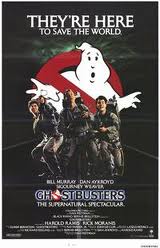
GHOSTBUSTERS
US, 1984, 100 minutes, Colour.
Bill Murray, Dan Aykroyd, Sigourney Weaver, Harold Ramis, Rick Moranis, Annie Potts, William Atherton, Ernie Hudson.
Directed by Ivan Reitman.
Ghostbusters was one of the biggest box office successes of 1984. it is an amusing comedy relying on special effects for the presence of ghosts and spirits, for getting rid of them. It is also a humorous spoof on a variety of films from The Exorcist to Q the Winged Serpent.
The film was written by Harold Ramis and Dan Aykroyd who had worked in Saturday Night Live with Bill Murray and director lvan Reitman. They had between them been responsible for such films as National Lampoon's Animal house, Caddyshack, Stripes, Meatballs. Dan Aykroyd teamed often with John Belushi in such comedies as 1984, The Blues Brothers, Neighbours. He also made his mark in the comedy Trading Places. Murray was a star of Tootsie and the lead in a remake of The Razor's Edge. They are very good comedians - but have left Murray in the limelight for this film. The female lead is Sigourney Weaver, the survivor or Alien and the star of Eyewitness and The Year of Living Dangerously.
The film doesn't remain much in the mind afterwards - but it is amusing while on screen. The popular song (popularised by video) is by Ray Parker Jr. and the incidental music by Elmer Bernstein.
1. The success and popularity of the film in 1984? The United States? World wide?
2. The quality of the comedy? Spoof, sight gags, verbal jokes, imagination? The spoof of horror and supernatural films: The Exorcist, The Sentinel, Q the Winged Serpent etc.? The need for poking fun at the serious supernatural films?
3. Panavision, New York locations? The lavish style? The Ghostbuster headquarters, the public library, the streets? Dana's art deco apartment building? The special effects for ghosts, for the ghostbusting, for the horror presence of the gods? The monsters and the finale? The humour of the giant marshmallow man? Enjoyable special effects?
4. The musical score and atmosphere, the theme music? The prologue – with the library incidents and the title?
5. Audience interest in parapsychology? The credibility of this kind of behaviour? The '80s and the pervading interest in parapsychological behaviour and experiences? The jargon? Turning it into a science? Study, ancient mythology, the influence of films?
6. Pete and his work, the tests that he carried out - favouring the girl, not favouring the young man? Ray and his knowledge? Igor and his skills? Their black helper? The library and the effects, their losing their job at the university. the setting up of Ghostbusters?
7. Looking over the apartment, Ray wanting it, the pole? The office, the laconic secretary - and her enthusiasm when calls came? The humour in the ghostbusting at the restaurant - the ghost in the corridors, going downstairs into the banquet room, gobbling the food? The chandelier and the mess? Trapping the ghost? Putting all the ghosts in the incinerator? The critique of the Committee for the Protection of the Environment? The officious representative and his antagonism?
8. Dana as the attractive heroine? Her musical background? The apartment? Louey and his forever trying to chat her up - and being locked out? Bringing the food home, the eggs cooking on the table, the god in the fridge? Consulting the Ghostbusters? Pete and his attraction? His going to visit her home? Her musician friend and Pete hanging around? Her phone call to her mother? Her becoming possessed - with the satire on The Exorcist?
9. The theories of ancient religions, the god taking over, the building and its being possessed, the animals, the key and the lock? Louey being chased - the humour of the chase and his being possessed? Dana and her Exorcist behaviour - her levitation, voice etc.?
10. The ghosts let loose, the Ghostbusters and their confrontation? Their being imprisoned - and going to the Mayor? The official arguing with the Mayor? The appearance of the goddess? The marshmallow man and his eventual splattering? The happy ending?
11. The background of religion, texts - and the use of the apocalypse and biblical overtones? The card, the prayer?
12. The deadpan humour, the jokes, the farce - a successful blend echoing interests of the '80s and satirising them?
Published in Movie Reviews
Published in
Movie Reviews
Tagged under
Saturday, 18 September 2021 19:22
Getting Straight
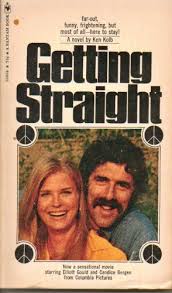
GETTING STRAIGHT
US, 1969, 123 minutes, Colour.
Elliot Gould, Candice Bergen, Robert F. Lyons.
Directed by Richard Rush.
Getting Straight is one of those campus revolution films of 1969-70 that were severely rubbished by the critics as being phoney and commercial exploitation of serious social situations, (The Strawberry Statement, R.P.M.). Getting Straight is certainly well made, even if the techniques are slick. The students here are not the freshers of The Strawberry Statement, but older students. In fact, the hero has been at University, served in Vietnam and returned to further his studies for a teaching career. The level of protest, therefore, is older and potentially more telling. However, Elliot Gould is not entirely sympathetic as the hero and the proceedings turn to farce during his oral examination of Scott Fitzgerald. The language and behaviour of the students are particularly frank in this film and the scenes of campus violence particularly strong, showing the provocation on both sides. The film was quite popular when released. It is a film for older audiences both in tone and in sympathy with the (comparatively) older hero and his interests.
1. This film was severely attacked by critics for being shallow, slick and exploiting and commercialising campus unrest. Do you agree with these charges?
2. Would the impact of the film have been different had it had for its hero a 20 year old (like The Strawberry Statement) instead of a man who had been to University, to Vietnam and had grown a bit older and wiser before his return to campus?
3. What impression of the American university life did the opening scenes of crowds, hustle and mechanisation make?
4. Was Harry a revolutionary? What did he want to make of his life?
5. Was Harry a likeable hero - a mixture of Groucho Marx (and Elliot Gould in other films) and a student, promiscuous, selfish, abrupt, cheating, trying to be 'honest'? He wants to get teacher credentials.
6. Was Jan a likeable heroine - intelligent, 'ruined', searching, intense, conventional, loving, 'bitchy', not wanting to be a servant, wanting a normal life?
7. How typical was Nick - 'high’, odd, clever, clown, his act to avoid the draft. his haircut and change to the marines ' who want people who are mad to kill, not just mad'?
8. How typical was Bill - doctor, patronising, as amoral as the next man, but conventional?
9. What picture of university life did the film give - study. crowded, earthy, amoral, crude; demonstrations and rioting; intensity; black and white Americans? Yet Harry says it is isolated - he was at Selma; the comments on Vietnam -'The graves come to the surface during the floods'.
10. Did the film take sides during the riot scenes or did it film them impartially (student stirring and provocation as well as police brutality)? There are senseless bashing on both sides. What sense did the violence make?
11. How responsible was Harry in his interview with the Dean? How responsible was the Dean?
12. How much compromise has to be? - the liberals don't want the universities run by kids; the administrations are unreal and twenty years too late in their offering of responsibility - like inviting some hundreds of peasants to a ball to stave off the French Revolution.
13. How much freedom to make mistakes should be allowed? Why does the suppression of choice make revolutionaries of protestors?
14. Does Harry find himself? He ridicules Jan for her conventionality and then wants to make himself and be a teacher.
15. Was the caricature on University academics and the exam too heavy-handed? What was the purpose of emphasising Scott Fitzgerald and homosexuality by the fanatic professor?
16. Harry wants to teach authentically. How right is he in saying that university degrees are 'publicly-endorsed crap'?
17. What does the end of the film mean? Is the real world so completely stupid that oneself and love are the only authenticity?
18, Why was this film made? What effect would it have on 'campus radicals'? on parents and teachers?
Published in Movie Reviews
Published in
Movie Reviews
Tagged under
Saturday, 18 September 2021 19:22
Get Crazy
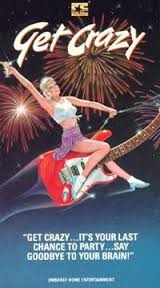
GET CRAZY
US, 1983, 88 minutes, Colour.
Malcolm Mc Dowell, Daniel Stern, Allen Goorwitz, Ed Begley Jr, Lou Reed, Mary Woronov, Dick Miller.
Directed by Alan Arkush.
Get Crazy would have to be an outstanding oddball film. It is difficult to detect for whom the film was made. It purports to show New Year's Eve in New York '82-'83. With the focus on a theatre (like American Hot Wax), Allen Goorwitz is preparing his 15th. anniversary New Year's Eve Show. Daniel Stern is his stage manager. Many things go wrong in the theatre, the groups put on tantrums, there is an evil group with subtitle 'The Baddies' to indicate them, led by Ed Begley, who come to a stink-bomb end, a heroine who used to work for Goorwitz and who falls in love with the stage manager, the stage manager's
star struck younger sister etc. etc.
The whole thing is presented frantically with so many touches of adolescent humour. Dialogue and subtitles are corny. Once the music starts it is of the raucous rock and punk style. The most surprising thing is the lead billing given to Malcolm McDowall? who portrays a Liverpool rock and roll star 20 years on. He has several provocative numbers - imitating various rock stars. He also has some execrable dialogue, especially in a toilet at the end.
The film has several technicians and actors and actresses from Roger Corman's New World Company. It was directed by Alan Arkush who co-directed (with Joe Dante) the satiric Hollywood Boulevard. As a curiosity item for the people involved, Get Crazy is an almost must see. However, it is fairly excruciating to sit through.
Published in Movie Reviews
Published in
Movie Reviews
Tagged under
Saturday, 18 September 2021 19:22
Get Carter
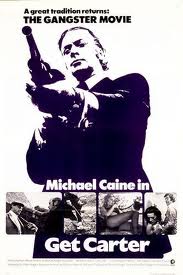
GET CARTER
UK, 1971, 112 minutes, Colour.
Michael Caine, John Osborne, Ian Hendry, Britt Ekland.
Directed by Mike Hodges.
The main reason for seeing this film is that you enjoy gangster movies. This it is, and quite a violent one whose impact is stronger than usual, probably because it is set in Newcastle- on- Tyne, in slums, on ugly bridges and dreary beaches - no Chicago mystique, no glamour, just greed, exploitation and perversion. There are no pleasant characters, not even Carter himself, though he shows some basic feelings which are then used to feed his revenge. Michael Caine is as usual as Carter. Playwright John Osborne portrays one of the villains. A grim story about the type of gangster you read about in most big cities
1. What audience is a film like this made for? Why?
2. The film presents an ugly world, an ugly underworld, Is such a prolonged immersion in such a world a healthy experience? or has the film positive merit? Redeeming features? Is there a value for the ordinary movie-goer to see something of this 'other' world? Why?
3. Is the film successful within its genre? What are the reasons for its success or failures?
4. How much of the film's success and impact depends on Michael Caine's performance as Carter? Why? What kind of person was Carter? Why? Good qualities? Bad? Could an audience identify with him easily? Was he on the side of good -against evil?
5. This kind of underworld is usually associated with America. What is the impact of seeing the British equivalent? Does it make it seem uglier or not?
6. What moral standards does the film work in - are there any standards? For Carter - what is the basis of his sense of right and wrong? Does it presuppose moral standards in the audience to judge the film by?
7. How did each of the supporting characters come across - as personalities or cliches?
8. What kind of people were they? How was this tested by their encounter with Carter?
- Anna - sensuality. fidelity;
- Kinnear - boss.. power, sleazy, cruel;
- Eric Paice - criminal, procurer. conscience-less;
- Glenda - ambiguous attitudes. saving herself;
- Brumby - racketeer;
- Margater, Doreen, Swift - the blue movie.
Were any characters pleasant at all?
9. How gratuitous the violence? How necessary?
10. The impact of the British, Newcastle environment on the action and issues of the film?
11. Carter's death - its meaning. as a conclusion to this film, the irony of it?
12. What was Carter's mission, purpose in life? Does this film bear much resemblance to the realities of modern gangster life?
Published in Movie Reviews
Published in
Movie Reviews
Tagged under
Saturday, 18 September 2021 19:22
Gervaise
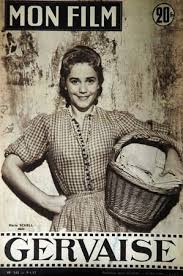
GERVAISE
France, 1956, 108 minutes, Black and White.
Maria Schell, Francois Perrier.
Directed by Rene Clement.
Gervaise is a film version of Emile Zola's novel of a character immersed in the squalid social conditions of late nineteenth century France. Here the atmosphere is excellently re-created and makes a great impression on the audience and makes the film worth seeing.
Maria Schell gives a fine performance as the partly likeable, partly repellent heroine who suffers in the harsh conditions in which her life has to be lived. As she is victimised by her milieu and by her enemies, we grow in pity for her and the film ends on a sadly depressing note. Rene Clement has directed such fine films as Forbidden Games, Full Sun and Rider on the Rain.
A moving version of a novel by a famous author.
1. Comment on the effectiveness of the period atmosphere of the film - e.g., the laundry, the shops, the dinner and the goose. Did the film immerse its plot and its issues in this authentic period setting?
2. What kind of a woman was Gervaise - were we supposed to like her, to pity her? How did she change during the film?
3. How did she react to being abandoned by her de facto husband, left sad and abandoned with her children? What rights did she have in the France of her time?
4. Why did the film make so much of her fight with Virginie in the laundry?
5. How did her husband and her married life change Gervaise - ambition, the shop, looking after her husband, a sense of achievement?
6. How did Virginie take over Gervaise's life?
7. Why did Gervaise fear her former de facto husband and take risks?
8. Comment on Virginie's revenge on Gervaise - ruining her by love and deception in her friendship.
9. What was the impact of the ending, the child, the drink and her mother's glazed eyes?
10. What social comment did the film offer on poverty, squalor, ambition, the love and hatred of ordinary working people?
11. Could the film be justly described as 'pessimistic realism'?
Published in Movie Reviews
Published in
Movie Reviews
Tagged under
Saturday, 18 September 2021 19:22
Gentlemen's Agreement

GENTLEMEN'S AGREEMENT
US, 1947, 118 minutes, Black and White.
Gregory Peck, Dorothy Mc Guire, John Garfield, Celeste Holm, Ann Revere, Dean Stockwell.
Directed by Elia Kazan.
Gentlemen's Agreement made a strong impression when released soon after the war. It had a double-edge advantage coming so soon after the war. On the one hand, Americans were revolted at Hitler's extermination of the Jews, on the other there were strong feelings of anti-Semitism amongst ordinary Americans.
Anti-Semitism? is frequently harder to pin down than the more obvious racism of black versus white. However, it has had an extraordinarily long tradition and has not been eradicated. This film shows it working in various sections of New York public life, and how a writer passing for a Jew finds prejudice and hostility where he did not expect it. The film is well made, although some of its techniques for getting its point across seem obvious. It was directed by Elia Kazan who has made some strong social dramas including A Streetcar Named Desire and On the Waterfront. More recently he made an autobiographical film, America, America (1963) and the interesting drama of modern business life and worries in the U.S., The Arrangement, based on his own novel.
Gentlemen's Agreement is a social film worth seeing and discussing.
1. What is your knowledge of anti-Semitism - in the past, at the time of the film's release? Today?
2. Are we really capable of feeling like someone else from the inside? Does this film help us to see this, and feel the anti-Semitic hostility?
3. Why is there anti-Semitism? Race? Money management? Beliefs? Does the film make this clear?
4. How does the film show this prejudice is manifested? Are people shown being hostile without their noticing?
5. Did you admire Phil Green? Did he do a good thing in passing for Jewish?
6. It could be said that his experience was not typical, as he tested all anti-Semitic feeling within a short space of time. Do you agree?
7. What is the role of Kathy? Ingrained prejudice of which she is unaware - (the best way she can console Tommy after he has been bashed is by reassuring him that he is not a Jew, that it was a lie). She sees prejudice, knows her family shares this, but does nothing about it.
8. What is the role of Phil's mother? Noble momism, the sturdy, tough, encouraging Mother America?
9. The film exhibits an extraordinarily optimistic vision of a great free America. Would this be included in the film now? What has happened to U.S. vision since 1947?
10. Discuss Dave as a 'typical' Jew.
11. Do conventions and the romantic ending spoil the impact of the film?
Published in Movie Reviews
Published in
Movie Reviews
Tagged under
Saturday, 18 September 2021 19:22
Gentlemen Prefer Blondes
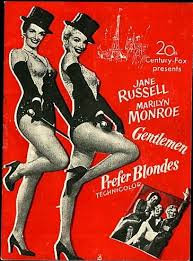
GENTLEMEN PREFER BLONDES
US, 1953, 85 Minutes, Colour.
Jane Russell, Marilyn Monroe, Charles Coburn, Elliott Reid, Tommy Noonan.
Directed by Howard Hawks.
Gentlemen Prefer Blondes is a very funny and entertaining musical. Based on the story by Anita Loos, it tells the story of two innocent naive gold-diggers. They are played by the sex-symbols of the 50s, Jane Russell and Marilyn Monroe. Jane Russell by this stage had already achieved a reputation for her style. Marilyn Monroe was just about to emerge in stardom. It was the period of Niagara and How to Marry a Millionaire. Some of their songs are most entertaining, especially Diamonds are a Girl's Best Friend'. The film was directed with great verve by veteran director Howard Hawks, a film-maker of the 30s and the 40s with a very wide range, from only Angels Have Wings through some war films and some bright comedies like Bringing Up Baby and Ball of Fire, he had made Red River and was soon to make Land of the Pharaohs. He continued with Westerns and comedies into the 60s and 70s. The film is entertaining and looks as if the whole cast enjoyed making it. There is some wry light comedy on American manners.
1. Was this an enjoyable musical comedy? Is it now dated? Why?
2. The importance of Marilyn Monroe and Jane Russell for this film? In their time? The impact now? Especially the way the camera focuses on them and presents them?
3. The film as: Americana; insights into American attitudes, American poses, American beliefs? - as comedy: is it funny? When? Why? - as satire: on human nature, on gold-diggers, foolish old men, rich young men, on American behaviour and attitudes, on the French, attitudes to women and sex? - as a film about women? Are they presented as persons? Are they sympathetic? Their ambitions for marriage, wealth, love? What aspects of women do Loralie and Dorothy represent? - as a comedy about men: the man in the film are inept. Why? How? Malone? Gus? His father? Sir Frances Beakman? (the contrast with Lady Beakman?) - as a film about love; how did Loralie and Dorothy love? Malone and Gus? How did true love triumph at the end? Did this ring true? -as a film about money: the emphasis and lines of dialogue on money, money-making, on diamonds, on greed? - as a film about fools: all the characters being foolish? How?
4. What did the songs contribute to the film? As entertainment? Satire? The girls from Little Rock: The goodbye song on the Ship? Dorothy's songs with the athletes? And Diamonds are a Girl's Best Friend, as sung by Loralie, as sung in the court by Dorothy?
5. The film had a happy ending recapitulating the Little Rock song from the beginning. How did this sum up the film? Was this a good film? Worth reviving?
Published in Movie Reviews
Published in
Movie Reviews
Tagged under